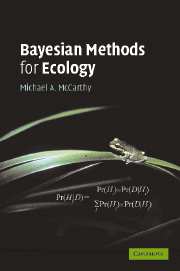Book contents
- Frontmatter
- Contents
- Preface
- 1 Introduction
- 2 Critiques of statistical methods
- 3 Analysing averages and frequencies
- 4 How good are the models?
- 5 Regression and correlation
- 6 Analysis of variance
- CASE STUDIES
- 7 Mark-recapture analysis
- 8 Effects of marking frogs
- 9 Population dynamics
- 10 Subjective priors
- 11 Conclusion
- APPENDICES
- References
- Index
11 - Conclusion
Published online by Cambridge University Press: 05 June 2012
- Frontmatter
- Contents
- Preface
- 1 Introduction
- 2 Critiques of statistical methods
- 3 Analysing averages and frequencies
- 4 How good are the models?
- 5 Regression and correlation
- 6 Analysis of variance
- CASE STUDIES
- 7 Mark-recapture analysis
- 8 Effects of marking frogs
- 9 Population dynamics
- 10 Subjective priors
- 11 Conclusion
- APPENDICES
- References
- Index
Summary
While this book argues that there are clear advantages of using Bayesian methods, it is unlikely that they will be used to the total exclusion of all others. However, there are four important benefits that mean Bayesian methods should be considered by ecologists.
Prior information
Bayesian methods use prior information when available, and the contribution of prior information is transparent. In the absence of prior information, parameter estimates are equivalent to those obtained by maximum likelihood estimation. Those uncomfortable with using prior information often ask: ‘What if my prior information is misleading?’ Such a question is analogous to: ‘What if my data are misleading?’ Ecologists do all we can to ensure our data are not misleading. The same needs to apply to prior information.
In the example of measuring the mean diameter of trees in a remnant (Box 3.2), it is unrealistic to assume that we do not have relevant information about the mean diameter of trees when we have measured every tree in 43 other similar remnants. Similarly, when determining whether a species is present at a site or not, it makes sense to use prior information about habitat quality to contribute to the data that are collected (Box 1.5). Prior information can be very cost effective, sometimes representing the equivalent of years of data collection (Box 7.4). So in addition to asking whether the prior is representative, we should also ask whether we can afford to ignore the prior information.
- Type
- Chapter
- Information
- Bayesian Methods for Ecology , pp. 244 - 246Publisher: Cambridge University PressPrint publication year: 2007



